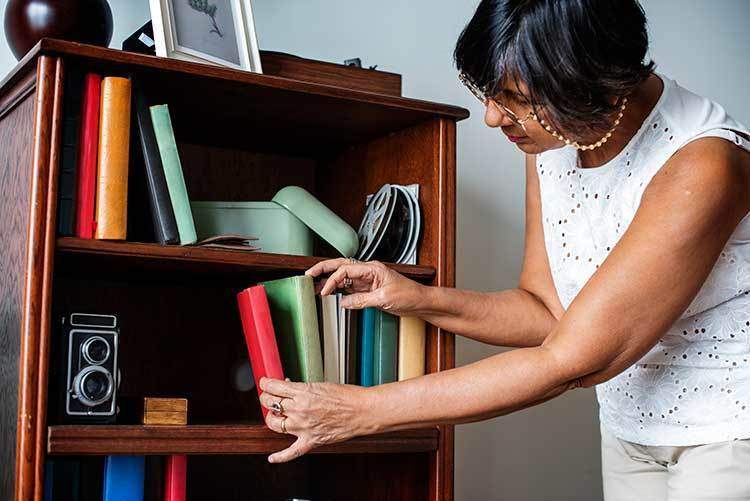Dan-Sha-ri order your life and your mind

- 3238
- 278
- Jeffery Jones
Hideko Yamashita, is the writer of: "Dan-Sha-ri: Order your life", a book that has been a resounding success, as well as her seminars and courses, who have attended many people who have transformed their lives, through this Method, one of its slogans is to "order without ordering", it sounds great, don't you think?
The Japanese writer had the habit of making Yoga from a young age, through the practice of this millenary discipline and inspired by a minimalist temple, elaborated the Dan-Sha-ri method, a philosophy of life based on simplicity, To do this, it is necessary to change the belief that: "subtract" or eliminate is something negative, while "add" is always beneficial or positive.
Buddha said that: "It is not richer who has the most, but the one who needs the least". This methodology of order, urges us to be happier living with less things and get out of our lives what is not necessary, have you reflected carefully, how much you buy really need?
Content
Toggle- What does “Dan-Sha-ri mean?
- Accumulation disorder: "pooling" or "haarding"
- 5 Gold Rules of Dan-Sha-ri
- Your house, your refuge
- Bibliographic references
What does “Dan-Sha-ri mean?
1.-Give. It means "vital energy", do not let your life into unnecessary things, cute the way, rejecting what you do not require.
2.-Sha. Eliminate what you once valued, but which is not currently functional, someone may really need what you only keep, you can give or recycle. "Let" unnecessary objects become a process of change and liberation.
3.-Ri. Learn to stop the desire to possess what you see and like, without you need. Cut the flow of things that enter your home, not taking everything they give you, if you will not occupy it.
Accumulation disorder: "Pooling"Or" Harding "
When a person assuages and organizes his space, however, soon there is a “disorder” again, there is an underlying psychological mechanism that leads to it. Also the people who "fill" their lives with objects, since they often try to "complete" with some material things in them in them.
To eliminate what you do not need, this method suggests: taking the object that costs you so much work to release, take it in your hands and say: "I'm sorry and thank you", this act will help to let go what we wanted so much with a goodbye , as who dismisses an endearing friend who accompanied us in a part of our way. When cleaning, selecting, eliminating and ordering, in this way, you can free yourself from physical and mental garbage.

When accumulation or "Pooling”(APA, 2010) becomes pathological, the accumulation disorder, in which the person is unable To maintain a safe environment for himself and even for others, they manifest a clinically significant discomfort, a deterioration in the social, labor or other important areas of functioning can be appreciated. Except when it is attributable to another condition, such as Prader-Willi (SPW) syndrome or cerebrovascular disease, to name a few examples (DSM-V, 2014). He accumulation disorder It is also known as Diogenes Syndrome.
People with Obsessive-compulsive disorder (TOC) They can also manifest behaviors of accumulation either "Hoarding”(APA, 2010) of unnecessary objects. He "Pooling"It also manifests itself in other disorders such as: major depression, cognitive deficit, major neurocognitive disorder, schizophrenia or other psychotic disorders, to name a few. When there is accumulation disorder, the subject requires psychological and sometimes psychiatric treatment, depending on its etiology.
5 Gold Rules of Dan-Sha-ri
"Your life must be like a river, where its channel always flows". Hideko Yamashita
1. Occupation rule. "You never fill a space at all". Occupies the spaces to 70 percent. When leaving a free area, things are taking their place, you will avoid the feeling of grab -bass, stress, visual load and you can locate your belongings easily without wasting time.
The free spaces, make air, energy flow and invite movement; While the accumulation of objects can be unhealthy for body and mind. It is healthy that the sun and air circulate in our spaces.
2. Replacement rule. Only incorporates what will replace the previous.
3. Touch rule. Save your belongings in a simple way and you can have access to them in one or two steps. Unlike Marie Kondo or Konmari's method, which invites us to use boxes, the Dan-Sha-ri proposes to use the spaces vertically.
4. Rule of autonomy, freedom and ease of handling. Access to our objects and spaces must be simple.
5. Automatic march rule. When you do a habit, a "automatic order mechanism" is established. It is associated with body physiology and the natural capacity of the body to self -regulate and respond to the stimuli presented.
Order without ordering? Sounds great! By practicing the Dan-Sha-ri, it is feasible that the order arises in each of the spaces of your life.
Your house, your refuge
Your home must be your refuge, a place where you feel comfortable, also within your spaces. Hideko Yamashita, also describes the Dan-Sha-ri method as a training, which can be applied to all areas of life, from organizing our clothes, furniture, digital information, thoughts and even relationships, among others. Life is ephemeral, the Dan-Sha-ri proposes to invest mainly in life experiences and not so much in material objects, ensuring that the former can enrich our existence more.

Bibliographic references
- American Psychiatric Association (2014). DSM-5 diagnostic criteria consultation guide. American Psychiatric Publishing.
- American Psychological Association (2010). APA. Concise Psychology Dictionary. Editorial The Modern Manual, S.TO. of c.V.
- Hideko Yamashita (2017). DAN-SHA-RI: ORDER YOUR LIFE. Editorial Planeta.

